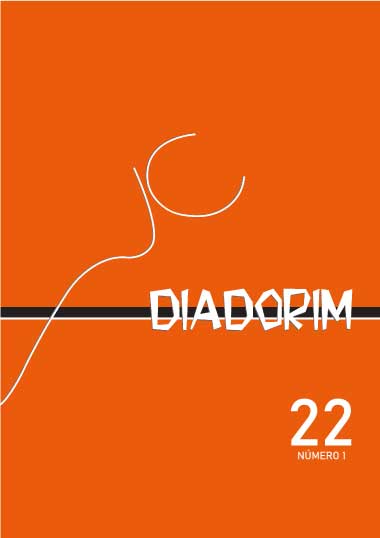Languages as resources: intercultural and inclusive language education at the BRICS scenario
DOI:
https://doi.org/10.35520/diadorim.2020.v22n1a32311Ключевые слова:
Languages as resources, Language education, intercultural approach, Digital technologies, BRICS.Аннотация
The need to develop language policies capable of resizing the role of languages and their value as a resource in the 21st century has been a central issue in contemporary discussions in different forums in the field of the humanities. In this scenario, understanding languages as resources means giving language education a leading role, since it is one of the privileged strategies for the promotion of information, knowledge and social inclusion for all people, in an equitable and democratic way. Given this, it is necessary to design language education on a new basis, reshaping approaches and principles that constitute it, in order to incorporate it necessary elements for a more effective intervention in multicultural and multilingual societies. To this end, I will discuss three central aspects that constitute important axes for the construction of different approaches to contemporary language education: a) language conceptions and languages as resources and their impacts on the constitutive elements of the process and on the practices of language teaching and learning; b) intercultural approach as a means of intervention and construction of educational experience; c) Digital technologies and their role in promoting free and open language access. To illustrate the discussion, I will present two ongoing projects. The first, already implemented and consolidated, is the project for the promotion and teaching of Portuguese within the scope of the Community of Portuguese Speaking Countries (CPLP) and developed by the International Institute of the Portuguese Language (IILP); the second, still being implemented, aims to promote the teaching of the four official languages of the BRICS, Portuguese, English, Chinese and Russian. Both projects using digital technologies as a privileged environment for access to free and quality language education.
Библиографические ссылки
ALVARADO, J. Pensar la educación en clave decolonial. Revista de Filosofía, Nº 81, pp. 103-116. 2015.
HABHA, Homi K. O local da cultura. Belo Horizonte: Ed. UFMG, 1998. 395 p.
DARVIN, Ron. NORTON, Bonny. Investment and Language Learning in the 21st Century. Dans Langage et société 2016/3 (N° 157), p.19-38. 2016. Disponível em: https://www.cairn.info/revue-langage-et-societe-2016-3-page-19.htm#. Acesso em: fev. 2020.
INTERNATIONAL Meetings on Multilingualism in Ciberespace (2008-2014). 2015. Final documents. Moscow: Interregional Library Cooperation Centre, 2015.
IILP. Instituto Internacional da Língua Portuguesa. Comunidade dos Países de Língua Portuguesa (CPLP). Disponível em: http://iilp.cplp.org/iilp.html. Acesso em 11 jan. 2020.
KRAMSCH, Claire. Cultura no ensino de língua estrangeira. Bakhtiniana, São Paulo, 12 (3): 134-152, Set./Dez. 2017.
LENA Resolution. Final document of the International Conference on Linguistic and Cultural Diversity in Cyberspace. Yakutsk, Russian Federation, 2 –4 July, 2008.
MENDES, Edleise. O português como língua de mediação cultural: por uma formação intercultural de professores e alunos de PLE. In: Mendes, Edleise. (Org.) Diálogos interculturais: ensino e formação em português língua estrangeira. Campinas/SP: Pontes, 2011. P.139-158.
MENDES, Edleise. O conceito de língua em perspectiva histórica: reflexos no ensino e na formação de professores de português. In: LOBO, Tânia et alii. Linguística histórica, história das línguas e outras histórias. Salvador-BA: EDUFBA, 2012. Disponível em: http://books.scielo.org/id/67y3k/pdf/lobo-9788523212308-47.pdf. Acesso em: jan.2020.
MENDES, Edleise. A ideia de cultura e sua atualidade para o ensino-aprendizagem de le/l2. EntreLínguas, Araraquara, v.1, n.2, p.203-221, jul./dez. 2015. Disponível em: https://periodicos.fclar.unesp.br/entrelinguas/article/view/8060.
O’DOWD, Robert. Online Intercultural Exchange An Introduction for Foreign Language Teachers. UK, USA; Canada: Multilingual Matters Ltd., 2007.
OLIVEIRA, Gilvan Müller de. Política linguística e internacionalização: a língua portuguesa no mundo globalizado do século XXI. Trabalhos em Linguística Aplicada, Campinas, v. 52, n. 2, p. 409-433, jul./dez. 2013. Disponível em: < http://www.scielo.br/scielo.php?script=sci_arttext&pid=S0103-18132013000200010 >. Jun.2019.
OLIVEIRA, G. O Instituto Internacional da Língua Portuguesa da CPLP. Linha D’Água, 32(2), 11-36. 2019. Disponível em: http://www.revistas.usp.br/linhadagua/article/view/154926. Acesso em: 11 jan. 2020.
PARAQUETT, Márcia. Thinking (and Doing) Otherwise com a Língua dos Hermanos. O Espanhol na Pesquisa e nas Políticas Linguísticas do Brasil. Letras & Letras | Uberlândia | v. 35 | n. especial | p. 109-116. 2019.
PETIT, Thomas. SANTOS, Gilberto Lacerda. Aplicativo MapLango: design de uma rede digital educacional para a aprendizagem nômade de línguas. In: C. G. SPINILLO; L. M. FADEL; V. T. SOUTO; T. B. P. SILVA & R. J. CAMARA (Eds). Anais do 7º Congresso Internacional de Design da Informação/Proceedings [Oral] of the 7th Information Design International Conference | CIDI 2015 São Paulo: Blucher, 2015.
PPPLE. Portal do Professor de Português Língua Estrangeira / Língua Não Materna. Instituto Internacional da Língua Portuguesa. Disponível em: www.ppple.org. Acesso em: janeiro 2020.
TOP Ten of Languages. Disponível em: https://www.internetworldstats.com/stats7.htm. Acesso em jan. 2020.
SALIDO, José Luis Ruiz. Los MOOC de lenguas -LMOOC-: Una visión etnográfica y evaluativa de la estructura y Composición de LMOOCS. Nuevas posibilidades para la Enseñanza de las lenguas extranjeras en la sociedade Del conocimiento. Máster Universitario en Comunicación y Educación en la Red. Madrid, España, Universidad Nacional de Educación a Distancia (UNED). 2018.
YAKUTSK Declaration. Final report. III International conference on Linguistic and Cultural Diversity in Cyberspace, Yakutsk, Russian Federation, 2014. Disponível em: http://ifapcom.ru/en/708/. Acesso em: jun. 2019.
WALSH, Catherine. Interculturalidad crítica y educación intercultural. Seminario “Interculturalidad y Educación Intercultural”, organizado por el Instituto Internacional de Integración del Convenio Andrés Bello, La Paz. 2010. Disponível em: https://www.uchile.cl/documentos/interculturalidad-critica-y-educacion-intercultural_150569_4_1923.pdf. Acesso em: mar. 2020.
WARSCHAUER, Mark. KERN, Richard. Network-based Language Teaching: Concepts and Practice. Cambridge University Press, 2000.
Загрузки
Опубликован
Выпуск
Раздел
Лицензия
Transferência de direitos autorais - Autorização para publicação
Caso o artigo submetido seja aprovado para publicação, já fica acordado que o autor autoriza a UFRJ a reproduzi-lo e publicá-lo na Diadorim: Revista de Estudos Linguísticos e Literários, entendendo-se os termos "reprodução" e "publicação" conforme definição respectivamente dos incisos VI e I do artigo 5° da Lei 9610/98. O artigo poderá ser acessado pela internet, a título gratuito, para consulta e reprodução de exemplar do artigo para uso próprio de quem a consulta. Essa autorização de publicação não tem limitação de tempo, ficando a UFRJ responsável pela manutenção da identificação do autor do artigo.

A Revista Diadorim utiliza uma Licença Creative Commons Atribuição-NãoComercial 4.0 Internacional (CC BY-NC 4.0).

